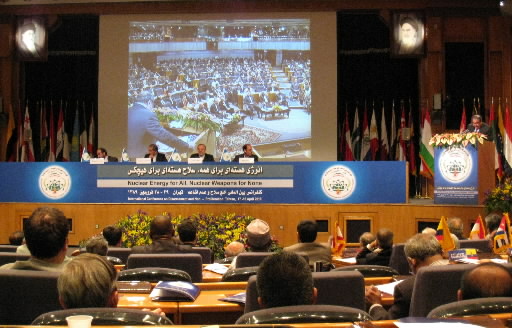Nuclear Weapons Can Be Eliminated: Chapter 10, Part 3
May 15, 2010
Chapter 10: The Middle East, Flash Point of the World
Part 3: Iran's assertion
by Keisuke Yoshihara, Staff Writer
Iran asserts that Islam forbids weapons of mass destruction
"There is a reason why Iran does not possess weapons of mass destruction. The reason is 'haram,' or acts prohibited by Islamic law, a system of law based on Islam."
An international conference under the banner "International Disarmament and Non-proliferation: World Security without Weapons of Mass Destruction" was held on April 17 and 18 in Tehran, the capital of Iran. The conference was organized by the Iranian government, gathering government officials and researchers from approximately 60 nations. In one subcommittee, a researcher working for an Iranian think tank forcefully expressed the above assertion.
The conference was given a slogan as well: "Nuclear Energy for Everyone, Nuclear Weapons for No One." Even from this slogan can be seen the stance of the Iranian government, which holds fast to its own uranium enrichment, saying such activity is for peaceful use.
A question was posed to the Iranian researcher: "Isn't peaceful use also 'haram,' a prohibited act? In what light should the possession of nuclear weapons by Pakistan, also an Islamic nation, be seen?"
The researcher responded, "Peaceful use is not prohibited. It is important to conduct military research in the pursuit of self-defense." With regard to the second part of the question, a government official from Pakistan gave a vigorous defense of the nation, saying, "We did not initiate the nuclear possession. The reason lies in the fact that India first possessed them."
Iran implements a system of governance led by Islamic legal scholars. Although the government has maintained that Iran will never pursue the development of nuclear weapons due to the strict "haram," the United States, which cannot shrug off suspicion of Iran's nuclear program, continues to hold that a nuclear attack is an option with regard to Iran and North Korea. In addition, the configuration of the Middle East still means that the matter of Israel, a de facto nuclear weapon state, could trigger a regional nuclear arms race in the name of "self-defense."
At one corner of the conference venue, an NGO called the Society for Chemical Weapons Victims Support held a panel exhibition presenting the damage caused by the atomic bombings of Hiroshima and Nagasaki. As Iran suffered damage from poison gas weapons in the Iran-Iraq War (1980-1988), it is said that Iran, more than the other nations of the Middle East, loathes the thought of weapons of mass destruction.
Indeed, many leading figures of the Iranian government pay visits to the A-bombed city of Hiroshima and learn about the consequences of the atomic bombing when they visit Japan. In many cases, though, they also reveal their anti-U.S. sentiments, saying such things as, "The United States should never be forgiven for dropping the atomic bombs."
Dr. Shahriar Khateri, head of international relations for the Society for Chemical Weapons Victims Support, stated: "Our government says its nuclear program is for peaceful use. We believe this to be true. Iran, which is well aware of the horror of chemical weapons, would never develop weapons of mass destruction. As long as the poison gas sufferers are alive, at least, it would never happen."
Through staging the international conference, the Iranian government sought to gain support from the people of Iran and of the world for its peaceful use of nuclear energy. But it has not yet dispelled suspicions over its military use of the same technology.
(Originally published on April 29, 2010)








